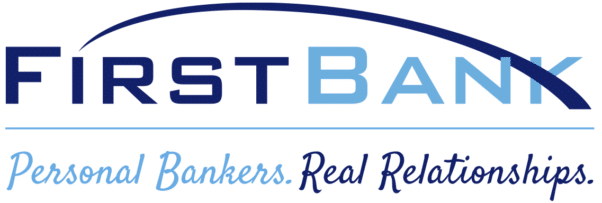Savings, MMA or CD: How Do I Know Which Is Best

The week of Apr. 8-12 is America Saves Week 2024.
Since 2007, America Saves Week has been calling on everyday Americans to commit to successful saving. With the support of numerous participating organizations, First Bank encourages individuals to conduct a financial check-up, gain insight into their finances, set savings goals, and develop plans to achieve them.
In recognition of America Saves Week, First Bank explains the differences between a Savings account, a Money Market Account (MMA), and a Certificate of Deposit (CD).
Regarding savings, it’s important to keep your money safe and earn a higher interest rate. Savings accounts, money market accounts, and certificates of deposit—called “share certificates” at credit unions—are all good ways to grow your savings, but they’re not all the same. First Bank explores the pros and cons of each so you can make a choice that works best for you and your money.
Savings Account
A savings account is a deposit account at a financial institution that you can add to and withdraw from. If you’re looking for convenience, you can link your savings to your checking account and set up automatic transfers to make saving easier.
The interest rate on your savings account depends on where you have the account and what type of account you open.
Pros:
- You’ll earn interest on your money, which generally isn’t an option with a standard checking account.
- You’ll have easy access to your account through online banking and ATMs.
Cons:
- Free withdrawals are sometimes limited to six per month; any more than that and you’ll likely incur fees. The same applies to MMAs.
- Financial institutions generally charge a monthly maintenance fee for checking and savings accounts. You can sometimes avoid paying these fees if you maintain a higher minimum balance.
If you’re saving for short-term goals, like an emergency fund or to make a specific purchase, you can consider a traditional savings account.
Money Market Account
Money market accounts function a lot like regular savings accounts. But unlike regular savings accounts, money market accounts come with other benefits. You can think of a money market account as a hybrid savings and checking account. MMAs generally pay higher interest than traditional savings accounts while giving you some of the flexibility of a checking account, including the ability to write checks.
Note: While they sound similar, don’t confuse money market accounts with money market funds, which are portfolios of investment securities, not financial institution accounts, and are not FDIC-insured. With a money market fund, contributions are invested in fixed-income securities like U.S. Treasury bills or stocks.
Pros:
- You’ll earn a higher interest rate than you would with a traditional savings account.
- Unlike with a certificate of deposit, there’s no required term, so you have more control over your money.
- You can easily access your money by writing checks or with a debit card at an ATM.
Cons:
- Similar to savings accounts, you are generally limited to six free transactions per month (there is often no limit on branch and ATM activity). Any additional transactions and you will likely incur a fee.
- To avoid higher fees, you could be required to maintain a higher minimum balance when compared to a traditional savings account.
Money market accounts are a good choice for medium-term savings goals — like saving for a down payment, home improvements, and other big expenses — when you want easy and quick access to your funds.
Certificate of Deposit
Certificates of deposit differ from savings and money market accounts in one major way: When you buy a CD, you’re saving for a set period of time. You’ll get a fixed interest rate and can withdraw your money when the CD matures. You can also roll the total amount into a new CD.
CD terms generally range from three months to five years (though some are longer) and you can choose the term that best fits your savings goals. To maximize your earnings and avoid penalties, you can do what’s called “CD laddering,” in which you open multiple CDs with different maturity dates.
Pros:
- You’ll earn higher interest rates than with either savings or money market accounts.
- Your rates are locked in for the entire term.
- You get to choose the term length.
Cons:
- CDs have less liquidity than a savings account or MMA. Access to your money is dictated by the term.
- You’ll pay a fee if you withdraw funds before your CD matures. However, you may be able to find a no-penalty CD.
A certificate of deposit is a good way to save for long-term goals where you don’t need immediate access to your cash.
Choosing the Best Strategy
Devising a savings strategy depends on your current financial situation, as well as your short- and long-term goals. You might want to take advantage of all three options, putting some money into a traditional savings account, some into an MMA, and some into a CD.
Learn more about America Saves Week and the Personal Savings and Money Market accounts at First Bank. First Bank is committed to doing its part to help grow the economy and create value for shareholders and stakeholders. With new branches, markets, products, and technology all under consideration, First Bank is equipped to help you reach your financial goals.
Join Our Community
Never miss a Delaware County story!
"*" indicates required fields







![95000-1023_ACJ_BannerAd[1]](https://delco.today/wp-content/uploads/sites/3/2023/03/95000-1023_ACJ_BannerAd1.jpg)

























